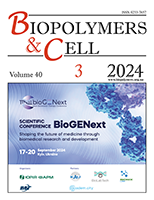Reinvigorating antitumor immunity in brain tumors with short peptides and siRNA–nanocarriers targeting the tumor microenvironment
DOI:
https://doi.org/10.7124/bc.000AF4Keywords:
antitumor immunity, brain tumors, short peptides, siRNA–nanocarriersAbstract
Aim. Tumor cells stimulate molecular, cellular and physical changes within their host tissues creating a tumor microenvironment (TME), a complex and continuously evolving structure which supports tumor growth and progression. Its composition varies between tumor types, but hallmark features include accumulation of myeloid cells, stromal cells, blood vessels, and extracellular matrix. Antitumor immunity is inhibited or eluded by tumor–secreted factors that reprogram infiltrating myeloid cells and create the immunosuppressive TME. Advancements in single–cell techniques allowed us to systemically profile the multiple–omic status of the TME at a single–cell resolution, revealing the phenotypes and functionalities of disease–specific cell populations. Conclusions. The results open up new perspectives in functional genomic studies and therapeutic targeting of microglia in brain tumors and other CNS diseases.Downloads
Published
2024-09-10
Issue
Section
Chronicle and Information

